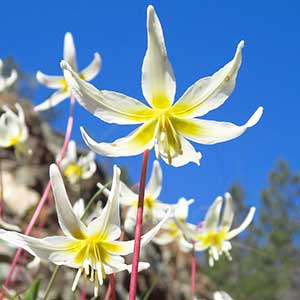Erythronium citrinum
Erythronium helenae
citrus fawn lily, cream fawn lily, lemon color fawn lily, lemon fawn lily, pale fawn-lily
Mount St. Helena fawn-lily, Pacific fawnlily, St. Helena fawn lily
slender, 40–50 mm, sometimes producing sessile offsets.
ovoid, 30–55 mm, sometimes producing sessile bulbels.
9–15 cm;
blade mottled with irregular streaks of brown or white, lanceolate to narrowly ovate, margins ± wavy.
7–20 cm;
blade mottled with irregular streaks of brown or white, broadly lanceolate to ovate, margins ± wavy.
12–35 cm.
12–30 cm.
1–3-flowered.
1–3-flowered.
tepals ± white, often pinkish, usually pale yellow at base, lanceolate to narrowly elliptic, 25–45 mm, inner with or without small auricles at base;
stamens 11–17 mm;
filaments linear, white or pinkish, slender, less than 0.8 mm wide;
anthers white, cream, pink, reddish, or brownish red;
style straight, white or pink, 6–10 mm;
stigma unlobed or with lobes shorter than 1 mm.
fragrant;
tepals ± white, bright yellow at base, pinkish in age, lanceolate to ovate, 25–40 mm, inner with small auricles at base;
stamens 8–13 mm;
filaments ± yellow, linear, ± slender, less than 0.8 mm wide;
anthers yellow;
style ± white, often bent to one side, 5–8 mm;
stigma unlobed or with lobes shorter than 1 mm.
obovoid, 2–5 cm.
obovoid, 2–4 cm.
= 24.
= 24.
Erythronium citrinum
Erythronium helenae
Plants lacking auricles on inner tepals are sometimes segregated as Erythronium howellii, Howell’s fawn-lily, but they do not appear to differ from typical E. citrinum in any other characters. Erythronium citrinum intergrades with E. californicum and E. hendersonii, occasional populations or individuals displaying intermediate or recombined characteristics. Such plants from the upper Scott River drainage in Trinity County, California, which may be the result of introgression with E. hendersonii, have been recognized as variety roderickii.
(Discussion copyrighted by Flora of North America; reprinted with permission.)
